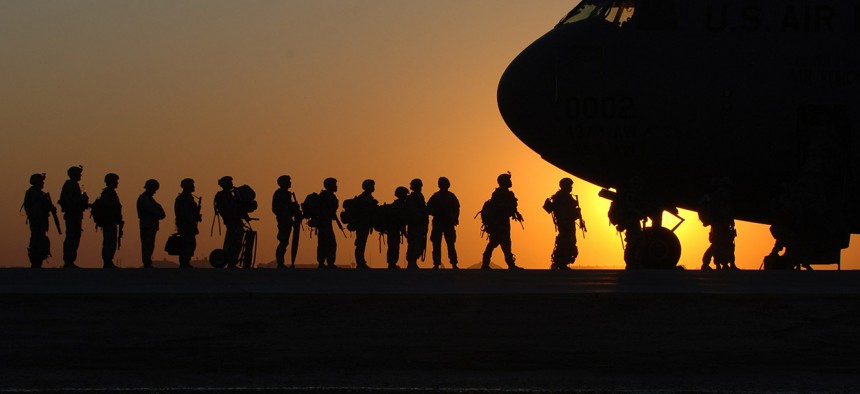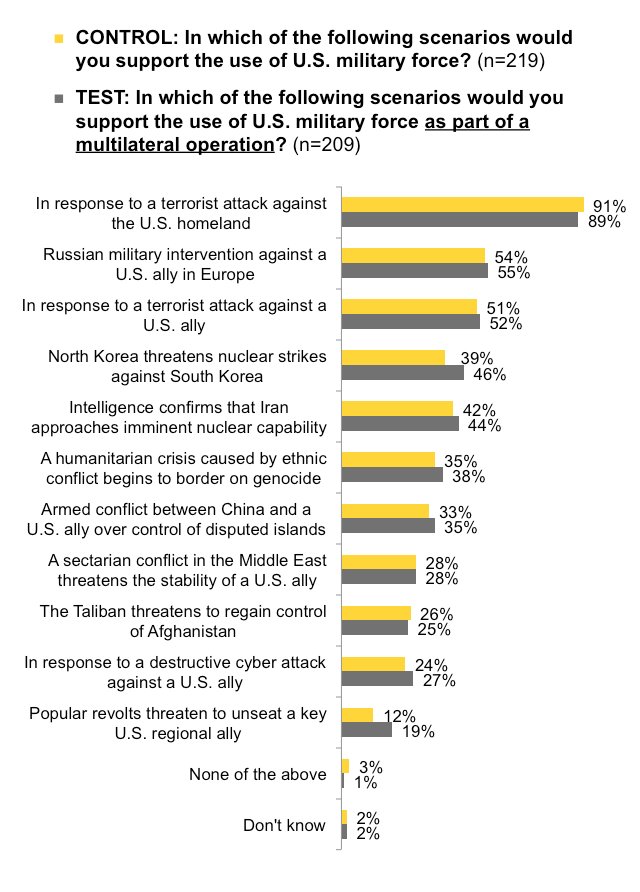
Multilateral or Unilateral Intervention? National Security Workers Have No Preference
Should the U.S. take a multilateral or unilateral approach to the use of force? National security professionals in government suggest it doesn't matter one way or the other.
The U.S. military faces a great deal of uncertainty as it recalibrates in response to a series of strategic surprises in 2014. But one thing seems clear by comparison - whether or not the U.S. takes a multilateral approach to the use of force makes little difference to the national security establishment in government. Existing public opinion data shows a general preference for the U.S. to act in tandem with the UN or NATO when using force. However, a recent Government Business Council and Defense One survey* of national security professionals reveals that this multilateral preference holds little water when put to the test.
For the same eleven intervention scenarios, one half of the survey sample (the control group) was asked the question, “In which of the following scenarios would you support the use of U.S. military force?,” while the other half (the test group) was asked, “In which of the following scenarios would you support the use of U.S. military force as part of a multilateral operation?”
For all but two of the scenarios, the difference between the two groups’ levels of support is negligible given the survey's margin of error (+/- 4.74%). For the two scenarios where a multilateral approach correlates with a significant increase in support for intervention - North Korea threatening nuclear strikes against South Korea and popular revolts threatening to unseat a key regional ally - respondents are still reluctant to support the use of force, with less half doing so in both cases.

What does this all mean? It suggests that the national security community’s strategic calculus for using force is not affected by whether or not a potential intervention is multilateral or unilateral. When push comes to shove, it seems the U.S. may be as likely to intervene abroad alone as it is in tandem with partner countries or multilateral organizations.
For more insights from the survey, take a look at these posts from Defense One:
“Political Dysfunction is a Worse Threat Than Putin, Say National Security Workers”
“National Security Professionals Pick Mitt Romney in 2016 Poll”
“Hagel Approval Rating Just 26 Percent Among National Security Workers, Troops”
*Defense One and Government Business Council, divisions of Atlantic Media’s Government Executive Media Group, sent an email-based survey to a random sample of Government Executive, Nextgov, and Defense One subscribers. Of those, 427 respondents from the Departments of Defense, Homeland Security, and State completed the survey, including those at the GS/GM-11 to 15 grade levels, active duty military personnel, and members of the Senior Executive Service; 55 percent of respondents are GS/GM-13 and above or the military equivalent; 77 percent are DOD civilians; 7 percent are active duty military personnel. The results have been weighted by service branch and agency. The margin of error is +/- 4.74 percent.
This post is written by Government Business Council; it is not written by and does not necessarily reflect the views of Government Executive Media Group's editorial staff. For more information, see our advertising guidelines.